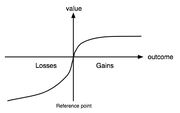Prospect Theory Come on down, and collect your NOBEL PRIZE! Prospect theory (Kahneman and Tversky) explains why we really do what we do, rather than what economists said we should be doing (expected utility theory - which is a theory of rational choice). Prospect theory describes choice behavior as reflecting the biases that we have, specifically with regard to estimating probabilities and referring to BASE RATES (you know who I am talking to!). More importantly, Prospect theory says all decisions (choices) are made in contexts, and those can vary from person to person, and even from time to time for the same person. You have to know the context in which a choice is made to be able to predict it. No one spends $10 on a hamburger at McDonalds, but lots of us would on a 5 hour flight after missing lunch. People use other heuristics, too, when they choose, and another key point is that choices are framed (affected by other options, and by recent other choices). A central feature of the theory is loss aversion, whereby losses feel worse to us that gains feel good (see figure).
Although people typically say the "prospect" part of this refers to a lottery like discussion, in the very excellent book (which will be on my students' GE reading list) The Undoing Project (author - Michael Lewis), K&T say they really just wanted a name for it that was not going to be confused with anything else that was out there!
To see where it all (kind of) began - "Prospect Theory: An Analysis of Decision under Risk" - available on the web and in local minds all around you.
